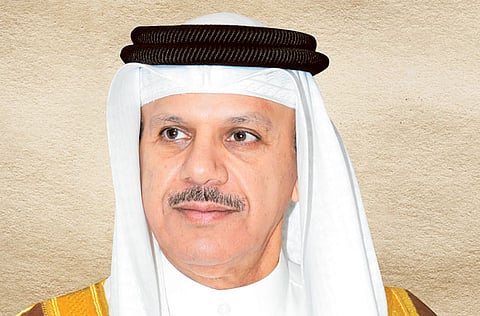Arab unrest brings Gulf citizens closer to leaders
GCC Secretary-General says Iran has right to a peaceful nuclear programme

Kuwait: Revolutions and bloody fighting have brought the peoples of the Arab Gulf countries closer to their leaderships, according to the Secretary-General of the Gulf Cooperation Council (GCC).
Speaking to Gulf News on the sidelines of a humanitarian meeting in Kuwait, Abdul Latif Al Zayyani said he is against using the term “Arab Spring” to describe the series of revolutions in five Arab countries in a span of 20 months.
“First, we don’t use the term Arab Spring… Spring doesn’t lead to killing. It is [a season of] beautiful days and has the flowers smell, not blood smell and killing” he said in response to a question on whether GCC countries feel concerned of a possible spread of protests to the oil-rich region.
“On the contrary, we look at it as opportunities that further consolidated peoples’ ties with their leaders. Everybody is keen to preserve their achievements and work to build on them,” Al Zayyani said.
“I believe every challenge to the region or the GCC is actually a chance that brings us closer, further unites us and proves our need to each other,” he said. He adding that the GCC leaders, long before the 2011 Arab revolutions, “agreed in 1981 on the necessity of developing the Gulf citizen as a focal point for their countries’ advancement.”
Responding to a question on press reports which warned of the increasing number of unemployed citizens among GCC populations, Al Zayyani said providing employment opportunities had been always among the topics on the table of discussion among the concerned GCC officials.
“The issue is always on the mind of officials and they are dealing with it,” he said.
The GCC includes Saudi Arabia, the United Arab Emirates, Kuwait, Qatar, Bahrain and Oman.
According to the World Bank, between two and three million people will be unemployed in the six Arab Gulf states in the next five years should there are no “corrective measures” in the labour market.
In other Arab countries where revolutions have taken place and protests have swept the streets, the deteriorating economic situation was instrumental factor behind the demonstrations.
The Arab Gulf states have accused Iran and other foreign elements of fomenting the protests in Bahrain last year and of plotting against their stability. Iran denied the charges. Gulf governments also, including the UAE, have announced uncovering “cells” of people planning to destabilise their counties’ security.
The Gulf States’ accusation of Iran’s interference in their internal affairs, coupled with concerns over Tehran’s controversial nuclear programme, is among the main issues behind the uneasy relations between the two sides.
Commenting on the reports that Israel could make a move and attack the Iranian nuclear facilities, Al Zayyani renewed GCC calls to solve conflicts in a peaceful way.
“We hope the issue will be solved peacefully. Iran has the right to have a nuclear capability to use it for peaceful purposes. This is a right for every country, but not for military purposes. We hope Iran will cooperate with the international community to solve the issue,”
he said.
Al Zayyani also expressed the hope of that a “swift” political solution to the Syrian crisis is reached.
“The GCC position has been clear, which is to call for peaceful transfer to power in Syria, and meet the aspirations of the Syrian people, stop the bloodshed and preserve the security and stability of Syria.”
However, Al Zayyani denied reports of a lower tone in the Gulf position towards the Syrian crisis.
“There is no withdrawal. On the contrary, we are keen in the GCC to be part of the Arab league [efforts] to end the crisis as soon as possible.”
Al Zayyani described the mission of the newly appointed UN envoy to Syria, the veteran Algerian politician Al Akhdar Al Ebrahimi, as a “difficult task” and expressed the GCC wish for the mission to be a successful one.
Sign up for the Daily Briefing
Get the latest news and updates straight to your inbox



